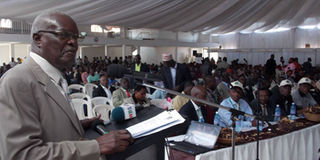Coffee farmers demand policy, government support

Gerald Sendaula addresses the convention participants. Photo by Michael J. Ssali.
What you need to know:
While coffee is a leading foreign exchange earmer, a policy to regulate the industry and guide its production has not passed.
Coffee farmers’ representatives from all over the country held a convention in Kampala last month under the National Union of Coffee Agribusiness Farmers and Enterprises (NUCAFE). It was the fourth such convention, the third one having been held in 2008.
The 2013 theme was: “Smallholder coffee farmers are a big business with enhanced social entrepreneurship and enabling environment.”
The key issues were highlighted by NUCAFE Chairman and former minister of finance, Gerald Ssendaula, who put government for its delay to pass the much-needed Coffee Policy, a legal document which can be used to ensure production of good quality coffee and to make Ugandan coffee more competitive on the world market.
Importance to economy
He reminded the participants during the 2008 convention, the then Prime Minister Apollo Nsibambi directed that a Coffee Policy be formulated within the four months that followed but years later, the policy has not been passed.
“Every time I talk about it I am told it is in cabinet,” he said. “But why is cabinet taking so long to pass it? Imagine oil was discovered recently and already there is an oil policy yet Uganda has been growing coffee for over a century but there is no policy to govern it?”
His tone appeared to indicate that the importance of coffee to the economy is not taken into account, yet it has always been one of the country’s major foreign exchange earners. On the global scale, it is the most traded commodity after oil.
Ssendaula also dwelt on the need to upgrade the Coffee Research Programme, located at Kituuza in Mukono, to the status of an institute. He said the programme, whose director, Dr William Wagoire, was in attendance, needs more funding to carry out research on coffee diseases and to engage in breeding for coffee varieties adaptable to climate change.
He also stated that for nearly 20 years, coffee farmers have been losing their crop to the Coffee Wilt Disease and the only solution that agricultural officers offer was to cut down the diseased crops and burn them.
Promote coffee
“This is what has kept our coffee production at between 2.5 and 3.5 million bags a year for decades when countries like Vietnam, which began coffee growing only 30 years ago are exporting an average of 30 million bags each year.”
Sendaula also stressed the need for more local consumption of coffee. “In Ethiopia about 40 per cent of the coffee produced is consumed locally while the amount we consume is negligible. We should have more coffee shops in all our towns so that the aroma of coffee is smelt everywhere,” he said.
The importance of gender equity in coffee farming was also pointed out as a major factor in improving coffee quality and family income and the role played by NUCAFE to enhance transparency in coffee growing households was lauded.
With regard to the smallholder farming being business with enhanced social entrepreneurship and enabling environment, Ssendaula observed that it is possible for a household with just one acre of coffee to boost their income without increasing the acreage of their garden as long as they choose to sell to those a few levels higher on the value chain.
“For example,we worked with some of our associations where a family with one acre of Robusta coffee has doubled its income by moving from selling kiboko coffee to selling graded coffee.”
Policy in process
Several other speakers made presentations at the convention. Mr Fred Luzinda from the Uganda Coffee Development Authority, assured the farmers that the coffee policy is about to be passed.
He also revealed that AGZ, a tissue culture laboratory, had produced about two million plantlets of Robusta varieties, which are resistant to Coffee Wilt Disease. These will soon be released to nursery owners across the country.
The convention was also addressed by Mr Abdul Kyanika Nsibambi, the Agricultural Credit Manager, Centenary Bank, who told the farmers that there were credit facilities available at the bank for farmers of all levels, small and large.




